 Once again a post for folks from the US. A lesser-known option for working in other countries is becoming a Foreign Service Officer for the US Department of State. What's that? You'd be embarking on a diplomatic career as a representative of the US government. You'd be required to move to new countries every two to four years and act as a representative of US interests in a wide variety of situations. You would likely be in an uncomfortable position of supporting policies which you may strongly disagree with. The State Department has a checklist you can go through to figure out if this is the right choice for you.
Once again a post for folks from the US. A lesser-known option for working in other countries is becoming a Foreign Service Officer for the US Department of State. What's that? You'd be embarking on a diplomatic career as a representative of the US government. You'd be required to move to new countries every two to four years and act as a representative of US interests in a wide variety of situations. You would likely be in an uncomfortable position of supporting policies which you may strongly disagree with. The State Department has a checklist you can go through to figure out if this is the right choice for you.Entrance is very competitive, but there are three requirements. Applicants must be:
- U.S. citizens on the date they submit their registration package
- At least 20 years old and no older than 59 years of age on the day you submit your registration
- At least 21 years old and not yet 60 on the day you are appointed as a Foreign Service Officer
Wikipedia has a nice introduction to many aspects of applying and working for the foreign service.
As a personal note, I would advise you to think carefully about this. I've had business with the US Embassy in Grosvenor Square, London, on a few occasions. As you're standing in line outside the embassy, staring at guards with automatic weapons patrolling the grounds, working your way through the tight security and the barricades to prevent vehicular assaults, you can look across the square to note the Canadian High Commission. There are no guards in sight. There are no barricades. You can walk right up to it. I've also had to be at the French consulate several times and it's the same: no guards or barricades. Few countries need to protect their foreign service properties quite as closely as the United States. If you're not comfortable with possibly being a target, this won't be the right position for you.
I tried this route about 25 years ago... and withdrew after the oral exam (which was indeed quite tough). Would advise against it unless you're sure that you're comfortable representing the foreign policy of the US in the entire world. Remember, you don't know where you'll be posted; think carefully about what you would do if you were posted to Iraq today; or to Nicaragua 25 years ago...
ReplyDelete